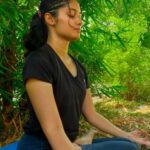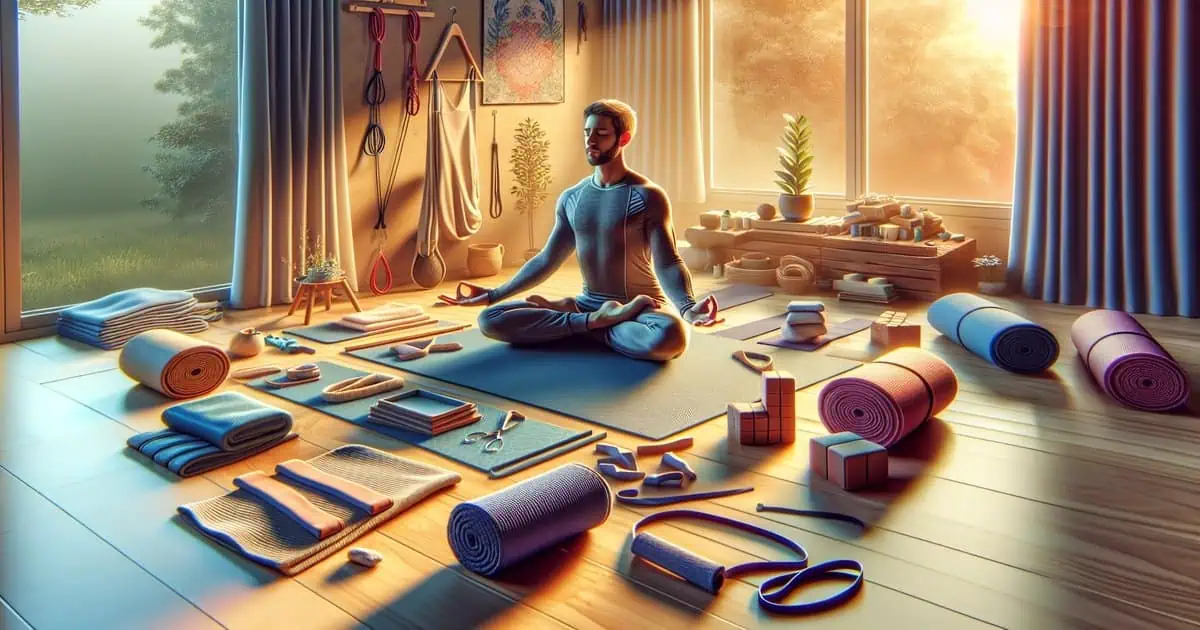Listen to this article:
Key Takeaway
Equip your home yoga practice with the 8 essential tools highlighted in this guide to enhance your comfort, focus, and overall experience, ensuring a fulfilling journey towards physical, mental, and spiritual well-being.
It may surprise you that over 300 million people have embraced the yoga movement globally by rolling out their mats. Yes, and I count myself among them! Yoga is a lifestyle choice for fitness and mindfulness, not just a passing trend.
However, having the correct yoga essentials is vital if I want to get into the zone in the comfort of my own home. It’s not about splurging on fancy gear but choosing quality pieces that enhance each pose and breath. Investing in durable, supportive equipment makes all the difference between a good session and a great one.
Contents
- 1 Selecting the Perfect Yoga Mat
- 2 Enhancing Practice with Yoga Blocks
- 3 Flexibility and Alignment through Yoga Straps
- 4 The Supportive Comfort of Yoga Bolsters
- 5 The Versatility of Yoga Blankets
- 6 Choosing Your Meditation Cushion
- 7 Incorporating Resistance Bands for Strength
- 8 Advancing with the Yoga Wheel
- 9 Closing Thoughts
- 10 Frequently Asked Questions
- 10.1 Do I need special equipment to practice yoga at home?
- 10.2 What should I look for in a good quality yoga mat?
- 10.3 How do yoga blocks enhance my practice?
- 10.4 What are the benefits of using a yoga strap?
- 10.5 Why do I need a yoga bolster, and how do I choose the right one?
- 10.6 Can I practice yoga without any equipment?
- 10.7 Where can I purchase reliable yoga equipment?
- 10.8 Was this helpful?
Selecting the Perfect Yoga Mat
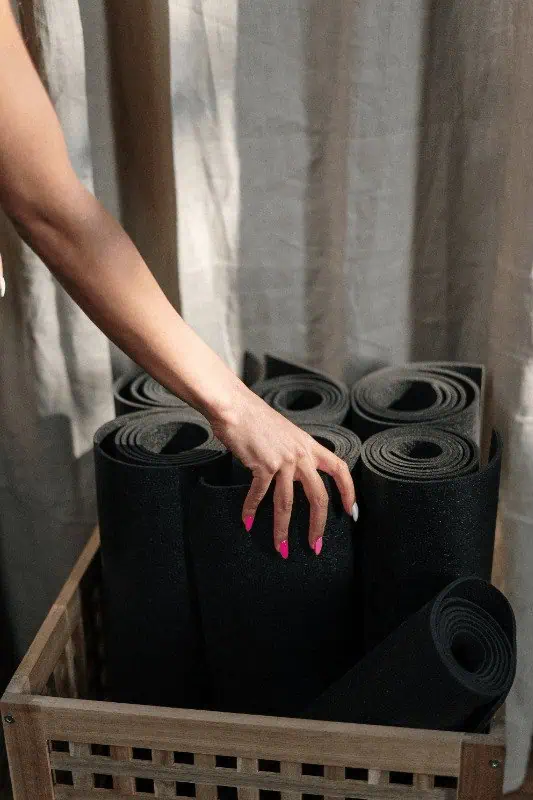
Grip and Material
I always look for a yoga mat with a strong grip. This prevents slipping during yoga practice, ensuring stability. The material matters, too. I choose eco-friendly options like natural rubber or jute.
These materials are kinder to our planet than PVC mats. They also offer excellent traction.
Thickness and Cushioning
The proper thickness of a yoga mat is crucial for comfort. Too thin, and my knees hurt; too thick, and I lose balance. A mat around 1/4 inch thick often strikes the perfect balance.
Cushioned support protects joints without sacrificing stability during challenging poses.
Mat Size
Mat size should allow freedom of movement. For me, extra-long mats provide ample space for all types of yoga practices.
A standard mat might be fine for some, but considering height and reach can guide your choice to ensure enough room to stretch out entirely on the mat.
A yoga mat is perhaps the most important yoga essential for yoga practice.
Enhancing Practice with Yoga Blocks

Deepen Stretches
Yoga blocks are indispensable yoga essentials needed for the practice. They are vital for deepening stretches. They help reach the ground in poses that feel too far away. Blocks make these poses easier and safer. I often place a block under my hand in Triangle Pose to lengthen my side without strain.
Some days, my muscles feel tighter. On such days, yoga blocks become even more essential. They allow me to modify positions to suit how I’m feeling.
Improve Balance
Blocks also improve balance during yoga practice. When standing on one leg, a block can offer stability until confidence grows. My first Crow Pose was successful, thanks to the support of two trusty blocks.
For beginners, balancing poses can be daunting. But with the aid of blocks, they become achievable and less intimidating.
Material Choices
Foam or cork? Each has its benefits.
- Foam is softer and lighter; great for travel.
- Cork feels firmer and sturdier, a great pick for those needing extra support.
My personal choice leans towards foam because it’s easy to carry along with my mat from home to class.
Portability Matters
Lightweight blocks are a must-have for yogis on the go. Heavier ones stay at home, while light foam ones come with me everywhere – perfect companions for outdoor sessions or visiting different studios after work.
Flexibility and Alignment through Yoga Straps

Strap Benefits
Yoga straps are vital items in enhancing flexibility. They help me reach limbs that are just a bit too far away. This lets me hold poses longer without strain.
Straps also improve alignment. They guide my body into the correct position. I avoid bad habits this way.
Buckle Types
Buckles on straps offer adjustability. Some buckles snap shut, while others tie or loop through holes. Each type changes how I use the strap.
The proper buckle gives a secure grip and quick release when needed. It makes switching poses smoother for me.
Choosing Length
Strap length is vital for my yoga gear collection. A long strap works best if I have a wide range of motion needs.
A short one might slip or not stretch far enough, disrupting my practice. So, picking the right length keeps me safe and supported during each pose.
The Supportive Comfort of Yoga Bolsters
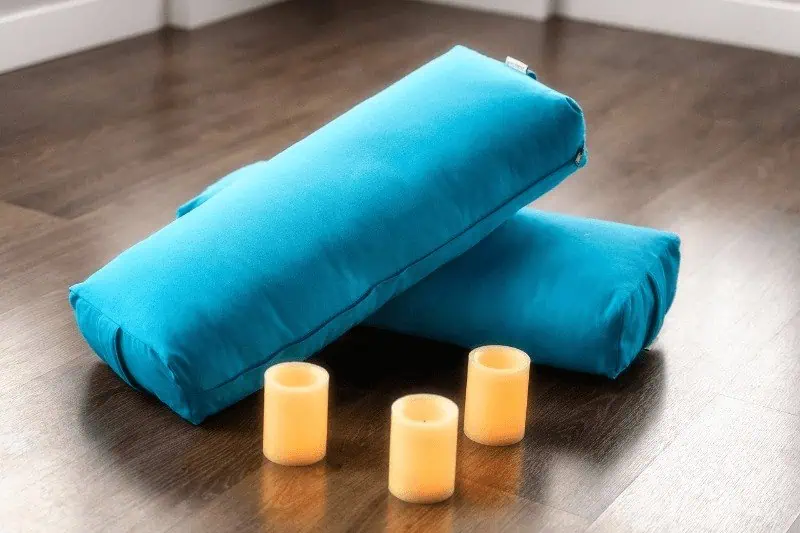
Shape Matters
Bolsters are essential for restorative poses. Their shape can significantly affect how your spine feels. I always check the bolster’s curve and firmness before buying. It must fit my back perfectly during yoga.
A good yoga bolster should not flatten easily. This is crucial for proper spinal support. My favorite one keeps its shape, even under my full weight.
Easy Cleaning
After a long session, bolsters can get quite sweaty. That’s why removable covers are important to me. They make cleaning simple and fast.
I look for bolsters with covers I can take off and wash at home. This way, they stay fresh for every practice session in the studio or at my house.
The Versatility of Yoga Blankets
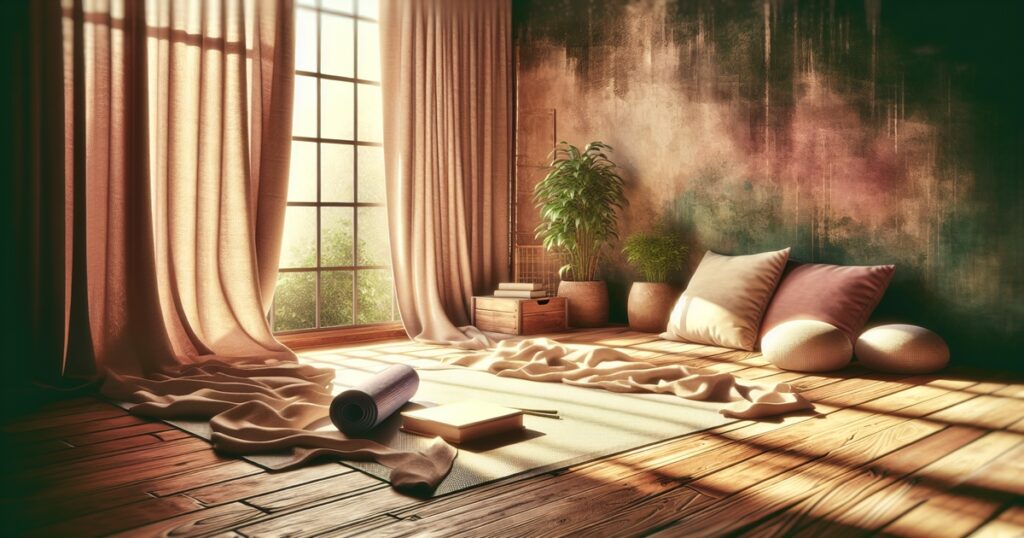
Prop Support
Yoga blankets offer versatile and extra support for many poses. They can be folded to create the right shape and firmness needed. In my routine, I use them in various asanas like supported bridge poses or seated forward bends.
These blankets are not just for comfort. They help me maintain alignment and prevent strain. For instance, they provide relief and enhance relaxation when tucked under my knees during Savasana.
Hugger Mugger Deluxe Wool Blanket
See latest priceMaterial Comfort
The material of yoga blankets affects how they feel against the skin. Some are made from cotton, while others might be wool or synthetic blends. I always look for a soft yet sturdy blanket to support my practice.
A good blanket should also keep you warm during cool-down periods without causing overheating mid-practice. My favorite is a fleece blend that offers warmth but breathes well when I start to sweat.
Durability Matters
Durability is key when choosing yoga accessories. A quality yoga blanket should endure frequent washing without losing shape or texture. This means looking for tightly woven fabrics that won’t unravel easily.
I prefer blankets that can withstand regular use because cleanliness is vital in maintaining a hygienic practice space. It’s reassuring to know my go-to prop remains intact wash after wash, ready for every session.
Choosing Your Meditation Cushion
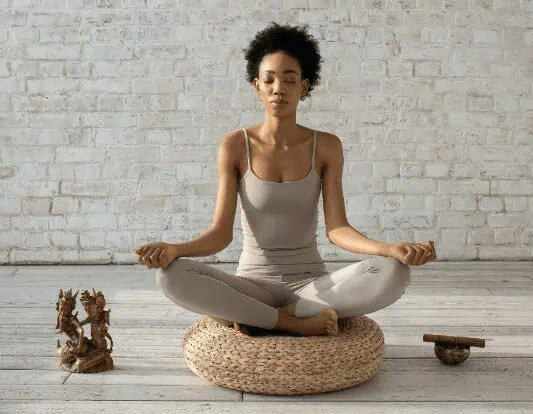
Cushion Height
When I meditate, the height of my seat is crucial. It helps me keep my spine straight and comfortable. If my spine isn’t aligned, I can get distracted by discomfort. A taller cushion might be better if you have tight hips or need more support.
A good meditation session starts with a proper foundation. Like a yoga blanket supports various poses, the right cushion height supports your meditation posture.
Hugger Mugger Zafu Meditation Cushion
See latest priceFilling Type
The filling in a cushion affects its firmness. This has a direct impact on my seated posture during meditation. Some fillings may settle over time and become less supportive, so it’s important to choose wisely.
I prefer buckwheat hulls because they conform to my body but provide enough support for longer sessions. Remember that firmer cushions offer more stability, which can help maintain your posture.
Portability Feature
Having a handle on my cushion makes it much easier to carry around. Whether moving from room to room or taking it outside, this feature adds convenience without compromising comfort.
Just as I select options for portability in other yoga essentials like mats and blocks, the same goes for choosing meditation cushions with handles – they’re just practical!
Incorporating Resistance Bands for Strength
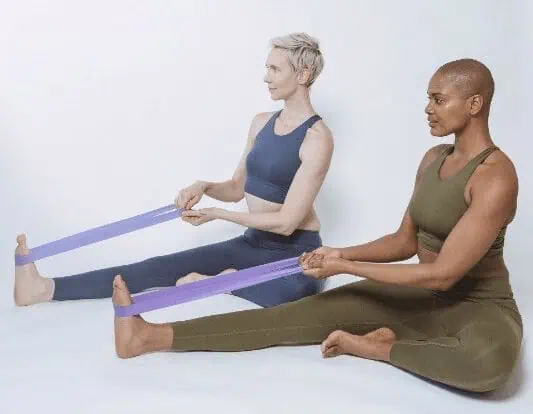
Band Intensity
Resistance bands are key for muscle growth. They provide varying levels of difficulty. I chose a band that matches my strength goals. This helps me progress steadily.
Using resistance bands, I feel the burn just right. It’s like lifting weights but with more control. And they’re easier on my joints, too.
Durable Material
The best resistance bands are tough and safe. They’re made to resist snapping under pressure. I always check that mine can withstand regular use without breaking.
Snap-resistant material is vital for safety during yoga workouts. It keeps me focused on my flow instead of worrying about accidents.
Versatile Exercises
Resistance band exercises fit well into any yoga routine. They add an extra challenge to poses like Warrior II or Chair Pose.
I weave band workouts into my practice seamlessly, enhancing stretches and balance work alike.
Advancing with the Yoga Wheel

Spine Support
A yoga wheel is a fantastic tool for enhancing backbends. It cradles my spine perfectly, mirroring its natural curve. This alignment allows safe and deep stretching without strain.
I find that using a yoga wheel after working with resistance bands helps to release any tension built up in my muscles. Its support makes me feel secure as I push further into each pose. Its sturdy construction means I never worry about it buckling under pressure.
Durable Design
The strength of a yoga wheel’s build is crucial. It must withstand body weight without warping or breaking. A good one stays strong even when I’m trying challenging new poses.
When choosing gear like this, durability matters to me as much as comfort does. My yoga wheel has repeatedly proven its worth, holding firm through every session. This reassurance lets me focus on my posture rather than the equipment.
Closing Thoughts
I’ve walked you through the yoga essentials that will support your practice, from mats to meditation cushions. Each piece plays its part in deepening your practice, whether you’re aiming for better alignment with straps or seeking strength with resistance bands.
Picture your yoga space as a personal retreat, where every item invites you to explore and expand. It’s not just about the yoga gear; it’s about providing a space for growth.
So what’s next? Dive in! Roll out that mat and feel the difference a block or bolster makes. Remember, yoga is a personal path—your essentials are your allies on this adventure. And if you ever feel stuck or curious, I’m here to guide you further into the world of yoga.
Now, take a deep breath and let your journey unfold.
Pop quiz! 🧘🤔
Yoga blocks are vital for deepening stretches
Yoga blankets are made from cotton
A yoga wheel is a fantastic tool for enhancing backbends.
Frequently Asked Questions
Do I need special equipment to practice yoga at home?
No, you don’t need special equipment to start yoga. Your body and some space are enough. However, certain items like mats can enhance comfort and safety.
What should I look for in a good quality yoga mat?
Look for a non-slip surface, the right thickness for cushioning (around 1/8 to 1/4 inch), durability, and material that suits your preferences and values.
How do yoga blocks enhance my practice?
Yoga blocks support alignment, deepen stretches, and make poses accessible when flexibility is limited. They’re like an extra limb offering stability and length where needed.
What are the benefits of using a yoga strap?
A yoga strap helps extend your reach on limbs you might not otherwise be able to grasp, improving flexibility and helping maintain proper alignment in poses.
Why do I need a yoga bolster, and how do I choose the right one?
You’d use a bolster for deeper support in restorative poses or seated postures. Choose one firm enough to hold its shape but soft enough for comfort.
Can I practice yoga without any equipment?
Absolutely! You can modify most poses with household items or even forego props altogether—yoga is ultimately about connection with yourself rather than gear.
Where can I purchase reliable yoga equipment?
Quality gear can be found at sports stores, dedicated online retailers, or directly from reputable brands focusing on sustainability and product excellence.

